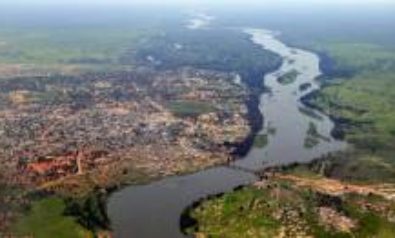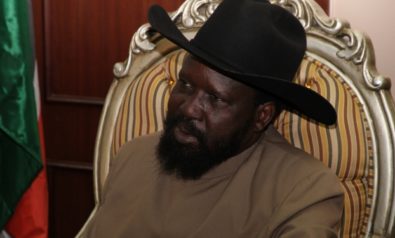In the 1989 movie Field of Dreams, an Iowa farmer envisions a baseball field as a voice says, “If you build it, he will come…” The farmer dreams of resurrecting Shoeless Joe Jackson and other old baseball legends by building a field of dreams.
It works. He builds his field of dreams and they come. But this is a Hollywood movie. And it’s a fantasy.
The 2011 International Engagement Conference for the Republic of South Sudan was held on December 14-15 in Washington DC with President Salva Kiir, his government from the world’s newest country and 750 others in attendance.
Attendees included representatives from humanitarian and finance organizations, American politicians and government officials, diplomats, investors, contractors, journalists and the South Sudanese diaspora.
The big Catch-22 issue at the conference was how to develop an economy that lacks the infrastructure and business, legal and political environment needed for this development. Limited to begin with, South Sudan’s infrastructure has been destroyed in civil wars over the last several decades.
South Sudan’s population of nine million is mostly rural and its $13bn GDP is primarily from oil. Vermont has twice the GDP but only 1/15 the population and 1/25 the area of South Sudan.
Is South Sudan a field of dreams? Do you build massive infrastructure first and hope that development then appears? Or should an economy develop gradually and in lockstep with infrastructure only as this infrastructure is required? How would each approach be financed?
Minster of Roads and Bridges Gier Chuang Aloung stood up at the conference and said, “We need 7,000 kilometers of roads!”
Mr. Aloung jokingly calls himself the minister of no roads and one bridge. The size of France, South Sudan has just 100km of paved roads. Now the world’s least developed country wants to leapfrog to 7,000km with virtually nothing yet to transport?
Because of its fertile land in the Nile watershed, South Sudan envisions itself as the “breadbasket of Africa.” But its nascent cattle and agricultural industries can’t begin to support the huge infrastructure needed to export such products. Should more modest agronomic and local infrastructure improvements to feed South Sudan itself take priority?
Many investment proposals were discussed for infrastructure, real estate, agriculture, energy and technology. One was to build a luxury hotel and another for 1,000 houses in Juba selling for $400,000 each.
$400,000? The annual per capita income in South Sudan is under $1,000 and most live on $1 per day. But, of course, these homes are for expatriates converging on Juba and trying to jump-start development.
In her keynote address, Secretary of State Hillary Clinton warned of the “resource curse” that could affect South Sudan’s oil reserves and other natural resources:
“We know it will either help your country finance its own path out of poverty or it will enrich a small elite, outside interests, corporations and countries, and leave your people hardly better off than when you started.”
Clinton mentioned oil-rich Norway, a key South Sudan supporter, and diamond-rich Botswana as countries successfully managing their natural resource wealth. But Africa is replete with countries that have fallen prey to the “resource curse.”
Complications exist since South Sudan’s oil reserves are dwindling and rely on pipelines through its fractious northern neighbor to reach Port Sudan on the Red Sea for export. There is talk of a new pipeline through Uganda and Kenya but this is wildly expensive and would take years.
To his credit, President Kiir stressed that his government is striving for transparency, rule of law and accountability to save South Sudan from the kleptocracy and corruption bedeviling other African nations. Kiir acknowledged that his government must use declining oil revenues (which account for 98% of his country’s budget) judiciously over the next several years to create a diversified and sustainable economy.
The international development community sponsored the conference and was trying to parlay the euphoria over South Sudan into the cold reality of development and prosperity. World Bank president Robert Zoellick spoke eloquently of South Sudan’s promise and pledged support, as did his counterparts at the UN, IFC, USAID and OPIC.
President Kiir and his ministers mentioned a “master strategy” but none of the proposed projects were supported by business plans or market analyses. Do you build roads, pipelines, hotels and luxury housing first and then hope (and pray) that the market can somehow catch up and support this infrastructure?
South Sudan must establish a comprehensive country strategy that can be justified both economically and politically if it ever wants to wean itself off of public aid and become self-sustaining.
What happens to $400,000 homes and luxury hotels in Juba when the capital moves from that boomtown to the more centrally located city of Ramciel and oil revenues decrease? Do you want to be a lender holding this collateral or an investor wondering where your equity went?
Or do you start with smaller and less dramatic steps? Do you focus first on the health, education and security of your people? One of every 50 mothers in South Sudan die in childbirth. 70% of the population is illiterate. Millions died or were displaced in civil wars.
Instead of luxury real estate and high profile projects, what about basic infrastructure like water, power, sanitation, hospitals, schools, transportation and affordable housing, office and industrial space? This is the road to measured and realistic growth.
South Sudan should, of course, continue to rely on the international community for humanitarian aid to create the human resources required for any chance at economic development.
But this economic development is another matter and must be led by private sector lenders and investors. Their underwriting criteria and oversight are certainly more pragmatic and unforgiving than that from public sources. But private sector financing is market driven and will lead to a self-sustaining market economy.
“Where’s China?” shouted Sudanese billionaire and philanthropist Mo Ibrahim to the conference audience. Everyone looked around and shrugged their shoulders.
The world’s most voracious consumer and Africa’s biggest investor was conspicuously absent from the conference except for SinoPowell Capital, which represents large, state-owned enterprises in China. SinoPowell is establishing the $1bn SP Africa Fund to pursue, analyze, underwrite and finance investment projects in various sectors in South Sudan and throughout the continent.
Was this absence designed to show American favoritism for South Sudan and disapproval of China’s presence in North Sudan? Well, China is already in both countries and their checkbook is open.
Secretary Clinton said that South Sudan is “an infant on life support” but Mo Ibrahim cautioned that the world’s attention will soon move elsewhere. Already, we have North Korea on the front pages and next week it will be something else.
I talked with a battle-scarred rebel who was home after a long exile in Cuba. He spoke reverently of his old commander and the years when they lived in the bush and fought for South Sudan’s independence.
That commander was Salva Kiir. Fighting for 40 years, he led the way from the peaceful referendum in 2005 to South Sudan’s independence on July 9, 2011. But although they are inextricably linked, there is still conflict and simmering resentment between South Sudan and its northern neighbor despite the 2005 Comprehensive Peace Agreement.
President Kiir has pledged, “to forgive though we shall not forget.”
I told President Kiir that the black 10-gallon hat he wore throughout the conference reminded me of our iconic American cowboys, except that in our country the good guys always wore white.
Kiir laughed, “Senator Kerry gave me this hat when he visited Juba as a sign of your country’s friendship and support. When you visit, bring me a white hat!”
And sure enough, Kerry spoke the next day about the symbolism of this hat and the hope for South Sudan and Kiir. The two men embraced on stage and the world applauded.
South Sudan’s military and political battles appear to be largely over. Now the struggle to build a new nation has begun and the rebels must wear new hats and fight a different type of war. They have decisions and choices to make, alliances to forge, opportunities to pursue and temptations to avoid.
This will be their hardest battle. This will also be their greatest victory.
The views expressed in this article are the author’s own and do not necessarily reflect Fair Observer’s editorial policy.
Support Fair Observer
We rely on your support for our independence, diversity and quality.
For more than 10 years, Fair Observer has been free, fair and independent. No billionaire owns us, no advertisers control us. We are a reader-supported nonprofit. Unlike many other publications, we keep our content free for readers regardless of where they live or whether they can afford to pay. We have no paywalls and no ads.
In the post-truth era of fake news, echo chambers and filter bubbles, we publish a plurality of perspectives from around the world. Anyone can publish with us, but everyone goes through a rigorous editorial process. So, you get fact-checked, well-reasoned content instead of noise.
We publish 2,500+ voices from 90+ countries. We also conduct education and training programs
on subjects ranging from digital media and journalism to writing and critical thinking. This
doesn’t come cheap. Servers, editors, trainers and web developers cost
money.
Please consider supporting us on a regular basis as a recurring donor or a
sustaining member.
Will you support FO’s journalism?
We rely on your support for our independence, diversity and quality.







Comment
Well-written and insightful article. Author predicted South Sudan’s fall from grace very well. He should write more pieces like this……